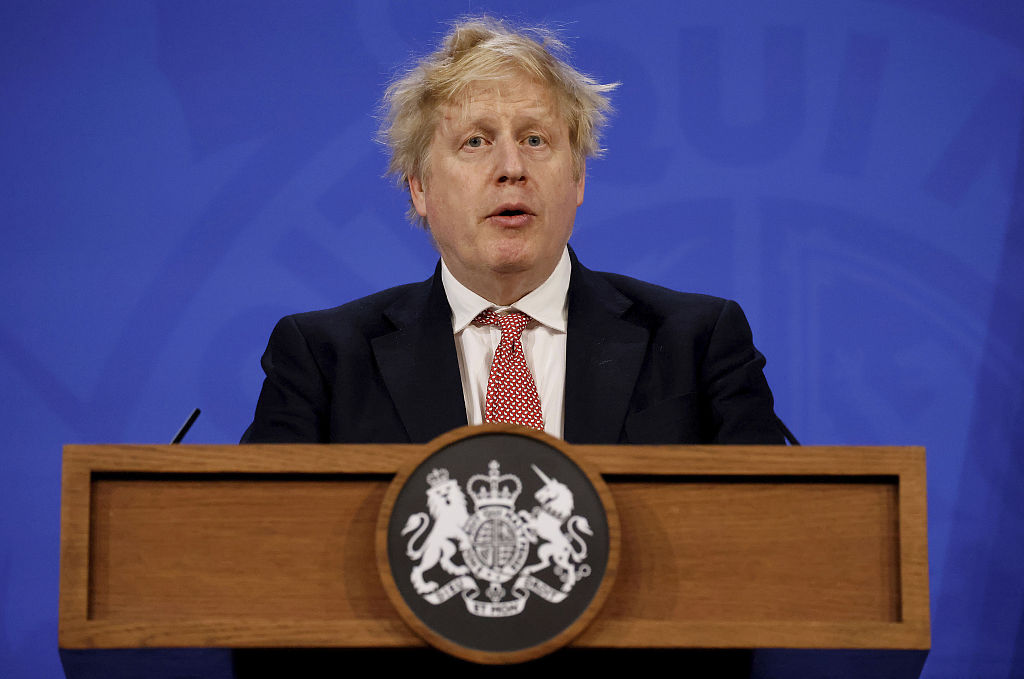
People wear masks as they cross a street in Guangzhou, south China's Guangdong Province, January 25, 2020. /CFP
People wear masks as they cross a street in Guangzhou, south China's Guangdong Province, January 25, 2020. /CFP
Editor's note: Keith Lamb is a University of Oxford graduate with a Master of Science in contemporary Chinese studies. His primary research interests are China's international relations and "socialism with Chinese characteristics." The article reflects the author's opinions and not necessarily the views of CGTN.
China has been taking flak from the Western corporate press for its supposedly "brutal" "dynamic zero-COVID" strategy which will lead to economic losses. Under this people-centered approach, using big data and molecular biology technology, the source of infection is detected within 24 hours, leading to strict localized quarantines to restrict the spread of infection. Under this strategy, the whole of society is involved in working with public health apparatuses to identify at-risk groups and vaccine coverage and make sure social distancing and mask-wearing are enforced.
In contrast, the UK, which follows a "living with COVID-19" strategy, makes vaccines the first line of defense; herd immunity is sought, and the public is encouraged to follow health and safety advice. Under this strategy, legal restrictions such as self-isolation no longer apply.
I have previously argued that the Western COVID-19 strategy is based on the short-term priorities of capitalism while the Chinese approach takes the long-term interests of all into account. Of course, Western capitalist states don't justify their strategies in this manner. The standard argument presented is that "living with COVID-19" prioritizes individual liberty and the economy while China's strategy prioritizes communal responsibility and life at the expense of the economy.
Undoubtedly, economic preservation vs personal liberty is complicated. If the economy is destroyed then human life becomes precarious. In contrast, a high death rate could also damage the economy and overwhelm health provisions, especially in a developing country, which could put serious limits on growth too.
While undoubtedly, China should be proud of its low COVID-19 death rate compared to the UK's high COVID-19 death rate, it would be naive to assume that China, which knows more than most how important economic development is, would destroy its economy, the very basis of life. The fact is China is following a "dynamic zero-COVID" strategy because firstly, it has proven to both protect life and the economy; secondly, considering China's unique conditions, it makes sense, and thirdly because China can!
China can do what the UK and the U.S. can't, not just because of its particular ideology, which I have discussed before, but also its social conditions. Take the ubiquitous volunteering of citizens who help implement the COVID-19 directives when lockdowns take place. They would not exist without a strong sense of community responsibility and widespread trust in government.
This contrasts with the UK where so confusing can the message be surrounding COVID-19 that those reading the corporate press will on one hand blame China for the "plague" that is COVID-19 but, on the other hand, simultaneously believe that COVID-19 is no worse than a common cold. Added to this cognitive dissonance is the fact that deaths may be inflated by categorizing all deaths 28 days after a COVID-19 positive test as a COVID-19 death.
Of course, China's swift approach to COVID-19 arose from its experience with SARS which caught the country unprepared. Thus, it may well be that any future epidemic, faced by Western countries, will also be dealt with using more effective measures, leading to a swifter communal response.
However, even if this is true, China's basic material conditions differ from Western countries. While China continues to make impressive progress in its social health care system it has nevertheless not yet reached advanced developed levels. Wu Zunyou, the chief epidemiologist of the Chinese Center for Disease Control and Prevention (CDC) predicts that if the dynamic zero-COVID strategy did not exist then there would be 47.8 million cases of COVID-19, and 950,000 deaths. This would overwhelm the health care system leading to a catastrophe.

UK Prime Minister Boris Johnson speaks during a media briefing at Downing Street, London, to outline the government's new long-term COVID-19 plan, February 21, 2022. /CFP
UK Prime Minister Boris Johnson speaks during a media briefing at Downing Street, London, to outline the government's new long-term COVID-19 plan, February 21, 2022. /CFP
Furthermore, one only needs to look at the economic dynamism of Chinese life, characterized by its high-density cities where populations, due to high-speed rail, are highly mobile, to realize how quickly COVID-19 could be transmitted if due diligence isn't taken. As such, China's COVID-19 strategy is one that any logical actor might take if placed in China's position.
Ultimately though, China's dynamic zero-COVID approach must also be analyzed based on protecting its economy which is the basis of long-term prosperity and thus life too. In this regard, China's early lockdown, against all naysayers, led to China's economy bouncing back quickly. What seemed to outsiders as a detrimental move turned out later to be correct. Consequently, why would we believe China is dropping the ball now?
At any rate, China's current approach is much more nuanced than what we are led to believe. Specific locations are locked down to prevent the epidemic spreading and causing economic disruption elsewhere. When recognizing that if China was a continent, it would be the second-largest, we can start to recognize how unrefined blanket criticism of China can be. Indeed, the lockdown of a few cities is a relative drop in the ocean.
In addition, where lockdown does take place, containment measures are taken to ensure that important industries, such as Shenzhen's tech industry, remain alive. Of course, as the evaluation of the situation changes so will China's strategy. The important point to bear in mind is that the Western corporate media, not being responsible for 1.4 billion Chinese citizens and not being intimate with China's conditions, is in a poor state to judge China's best course of action.
Thus far, China's economy has seen strong investment and consumer spending in 2022. While China's current battle against COVID-19 might challenge growth we should be mindful, considering current turbulent global conditions, that simply blaming China's COVID-19 strategy would be a course argument.
(If you want to contribute and have specific expertise, please contact us at opinions@cgtn.com. Follow @thouse_opinions on Twitter to discover the latest commentaries in the CGTN Opinion Section.)

